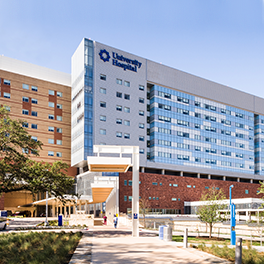At University Health, we provide advanced, minimally invasive image-guided procedures. Our interventional radiology team is composed of board-certified physicians who have achieved sub-specialty training through ACGME-accredited vascular interventional radiology fellowships. This means you have access to some of the nation’s top radiologists right here in San Antonio.
The interventional radiology clinic and procedure rooms are located on the 2nd floor of the University Hospital Horizon Tower.
What Is Interventional Radiology?
Interventional and vascular radiology are sub-specialties within the field of radiology. Radiology, also called imaging, uses technology such as X-rays, magnetic resonance imaging (MRI) and ultrasounds to create images of the internal organs in your body.
Interventional radiology involves making a small incision near the target area and using a needle or catheter, with the guidance of imaging, to treat your disease. This allows your doctor to see inside your body in real-time during a procedure without making a major incision.
How Does Interventional Radiology Benefit Me?
Interventional radiologists uses imaging to perform minimally invasive procedures to diagnose or treat a disease. Because your radiologist makes a small incision and uses wires or needles to access the deeper tissues of your body, you will have less scarring and a shorter hospital stay.
Oftentimes, your doctor may recommend interventional radiology as an alternative to surgery. This may mean you do not need to stay in the hospital to recover at all.
San Antonio Radiologists Focused on You
As a teaching hospital, University Health adheres to the gold standard of health care. We don’t cut corners or look for ways to make money. Our only goal is giving you the treatment you need.
Some private hospitals in San Antonio regularly send us their more complex cases to treat. They know that we have the capabilities to provide the highest quality care with top-of-the-line technology. We treat more complex conditions than any other hospital in San Antonio.
Questions for Your Radiologist
At University Health, we want you to feel comfortable with your radiology team and ask any questions you may have. We welcome you and family members to take notes while speaking with your doctor.
- Are there any alternatives to this procedure?
- Can you walk me through what will happen during the procedure?
- How much will the procedure cost?
- What are the risks and benefits?
- What may happen if I don’t have this procedure?
- What results should I expect and what will they mean in terms of next steps?
- Why are you recommending this procedure?
- Who should I call to discuss the results?
- Who will perform this procedure and what are their qualifications?
- Will I need to stay overnight in the hospital?
Interventional Procedures
Advanced vascular access
This manages diseases including:
- subcutaneous port catheter placements
- tunneled subcutaneous vascular accesses
- PICC lines
Biopsy
Drainage & Stents
Treatments for Peripheral Vascular Disease (PVD)
Gastrostomy Tubes
Hemodialysis access maintenance
Liver Treatments
Nephrostomy Drains & Urinary Stents
Peritoneal Dialysis Catheter Placement
Prostate Artery Embolization (PAE)
Tumor Loco-Regional Treatments
A wide variety of minimally invasive treatment options for a wide range of benign tumors and cancers including liver, lung, kidney and localized metastasis from colorectal, breast and others.
Includes:
- Ablation
- Chemoembolization
- Y-90 radioembolization


